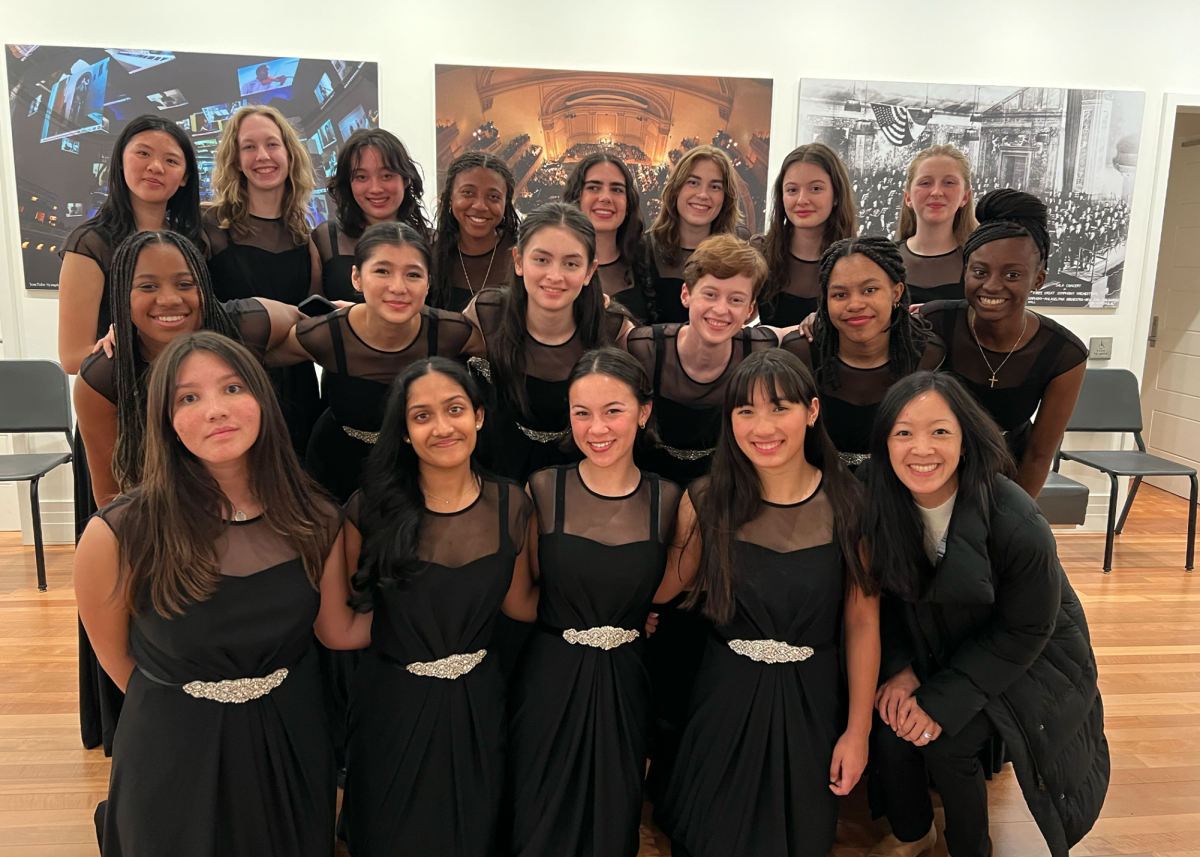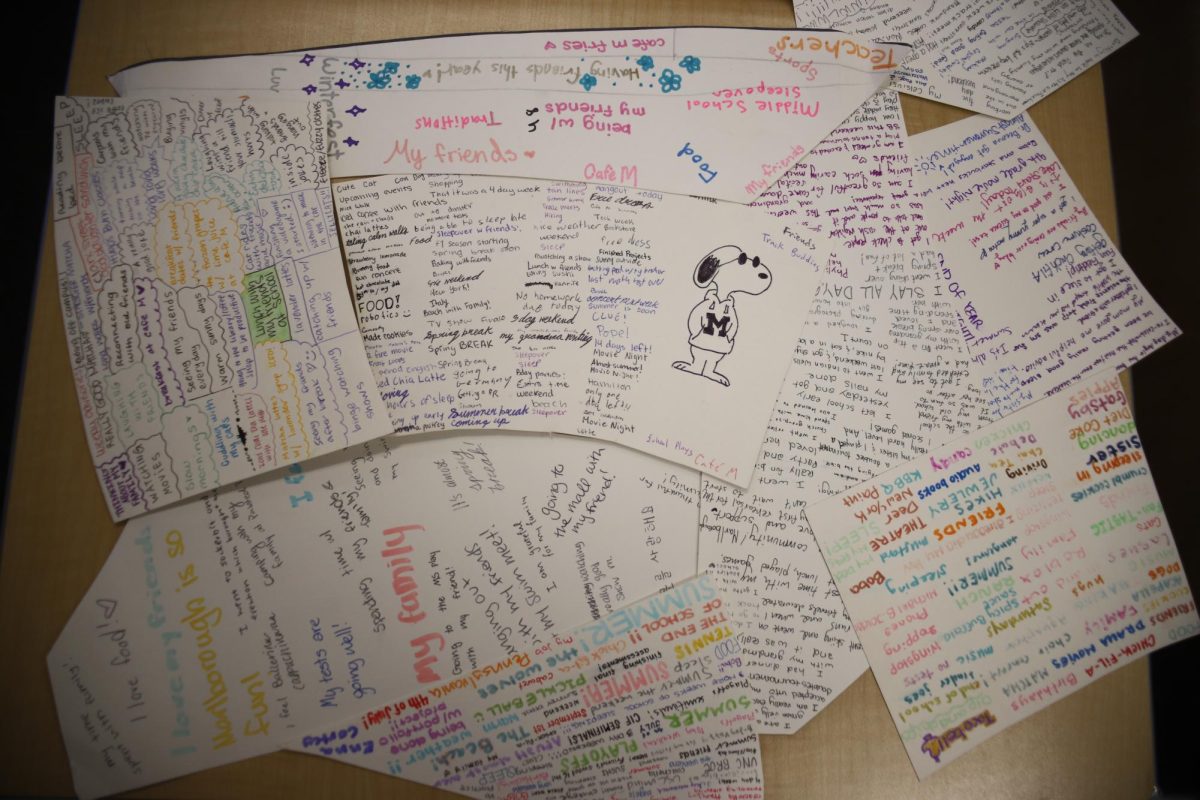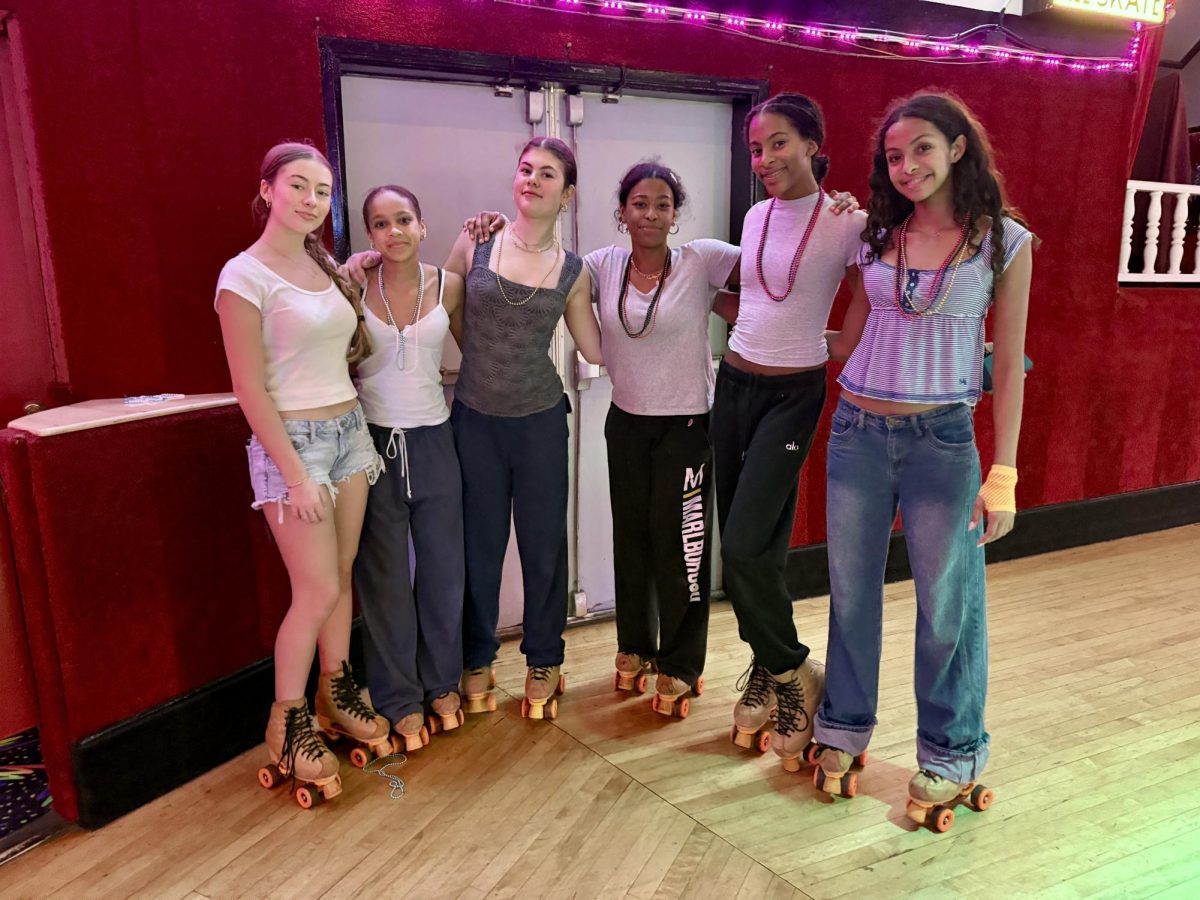We interviewed Cassidey ‘24 and Marcella ‘22 who starred as Sophie and Donna,
respectively, in the all-school musical “Mamma Mia”, which played from Feb. 9 to 12.
Q&A with Cassidey ’24
Maya: What was your favorite part of being in “Mamma Mia”?
Cassidey: My favorite part of being in “Mamma Mia” was acting with my peers. I made friends from 7th to 12th grade, and there was so much community bonding. It was our first time to regroup in such a big setting and work together, so getting to know people was my favorite part of the entire process.
Maya: What was it like acting with a mask?
Cassidey: I get asked this question a lot. What we really had to pick up on from the very beginning was acting with our eyes, using very big expressions and communicating more with our hands. It was not as bad as it seems because we’ve been using masks [for] the past two years.
Maya: What was the most difficult part?
Cassidey: The most difficult aspect was going into a tightly knit environment as a newcomer. I’ve never done a Marlborough play or a musical before, and this was also my first year in person and on campus. Fitting in and making friends wasn’t difficult, but it was scary at the beginning trying to squeeze my way into such a strong community. I came to find comfort in that community over time.
Maya: Why do you think “Mamma Mia” seemed to gain so much attention, especially among the student body?
Cassidey: “Mamma Mia” is such a lovable production. It has classic songs, a lively plot and fun dances. I also think my casting generated some attention, because I was an incoming sophomore and I was new to the theater department, but also because I was a Black girl going for the role of Sophie. The iterations of “Mamma Mia” have all-white casts, so for me to go in and audition (and for a lead role, no less) gained a lot of attention – some positive, some negative.
Maya:When you initially got the role, how did you feel?
Cassidey: I felt empowered. Sophie’s role does typically go to a white girl, [although] her race does not play an integral role in her character development. I knew that my hard work was the reason why I was ultimately awarded the role. I thought it was almost revolutionary for me to be able to play her character. I was able to represent Black students who would love to pursue the arts but lack a voice in our community.
Maya: In what form did you receive backlash?
Cassidey: I heard racially motivated comments like “They only cast her because they needed a Black girl in the cast” or “why did she get the role when she doesn’t even look like a Sophie?” My hair color was brought up a lot. I love Amanda Seyfried, but I don’t think her blonde hair was what made her such a great Sophie! There was a definite disconnect among some of the cast members near the beginning of rehearsals because I was Black and everyone expected [the role of Sophie] to go to someone white. Most of this anger, backlash and criticism was not directed straight at me, but I was nervous to go into the rehearsal process given the whispers I heard and the coldness I felt.
Maya: How did you deal with those negative comments? Did you have a support system?
Cassidey: I have grown up preparing myself for a career in entertainment, so I learned very early on how to productively respond to negativity. I focused on my goals for the show and on doing the best I could. I could not let any comments get in the way of [my] work. And as you mentioned, I was able to seek support from Ms. Schultz, who directed the show, as well as the department chair Ms. Wina, and Ms. Elie, another theater teacher. I also talked to my incredible friends.
Maya: Would you say that people were being racist, or did their negative comments stem from jealousy?
Cassidey: I think that those intersect. One can understandably be jealous and upset, but if their [comments] stem from a place of discomfort with Black people or with a ruptured sense of racial entitlement, then [their comment] is still racist. The comments and the remarks and the actions and the closed-mindedness [I faced] came mostly from a place of racial privilege, and I think it’s important to acknowledge that.
Maya: How did you feel when “Mamma Mia” finally opened?
Cassidey: By playing Sophie and carrying through with it till the end, I proved that I was qualified for the position. I think that people grasped the passion that I felt for the role just based on my performance. The people who talked badly about me did not know me or what I was capable of, but that doesn’t matter much to me. My castmates and I are proud of the outcome, and there will be people who can’t be pleased, so why work to please them, you know? The show turned out amazing, even better than I could have ever expected.
Maya: Going forward, what work do you think needs to be done within the theater department to ensure that this doesn’t happen again?
Cassidey: I was very vocal about what I faced throughout the process to my Black friends and allies, but I admit I didn’t want to introduce the topic in rehearsals because I didn’t want to divert too much attention away from the musical itself. Work is never ever done, and in the future, I would like the theatre department to seek more diversity. I am the first Black girl to star in an all-school musical. I would love for more students of color to feel comfortable auditioning without fearing backlash or not being cast. I’m really excited that I am only a sophomore as I’ve been put in an incredible position to continue theatre here while simultaneously advocating for marginalized voices at our school. I will make sure to further establish a welcoming theatre community that prioritizes everyone.
Maya: How will you create that sort of environment?
Cassidey: There needs to be a conversation shortly after the cast list comes out, [like] a sit down talk where the adults or even students establish that any inconsiderate or mean behavior regarding their castmates is just going to be flat out prohibited. There were many conversations behind the scenes with staculty, but a lot of those conversations weren’t brought to light, [which meant] students felt they could say whatever they wanted to without facing real consequences. In the future, I’m going to host team bonding experiences because it can be easy to feel alone or isolated.
Maya: Can we expect to see more of you in Marlborough theater in the future?
Cassidey: I will continue in the theatre department for the rest of my time here at Marlborough. I can’t wait for our senior year musical. I know it’s going to be great, and I can’t wait to see everyone at auditions!
Q&A with Marcella ’22
Maya: What is your favorite memory from working on “Mamma Mia”?
Marcella: One morning before rehearsal right before tech week, the cast decided to come a bit early. We did an Italian run, where you do the musical much more dramatically and faster than it should be. It’s very ironic to see theater kids trying to be more dramatic than they already are, and it’s also a bonding moment. It really gets the energy up, which is exactly what you need right before the show to get out of your head and into your body. So that’s probably my favorite memory.
Maya: What was the most difficult part about bringing your character to life?
Marcella: What was really hard for Cassidey and me was finding a mother daughter relationship [because] we’re very close in age. It was particularly hard to embody an older woman, especially when like there’s so many moments throughout the show where she reflects on her younger self, [like] in Dancing Queen, where she reminisces about being seventeen. Once I focused on the storyline, it was easier to find that kind of maturity and the fun that Donna has.
Maya: How did you get to know your castmates?
Marcella: I knew a lot of the people in the cast from Legally Blonde, but I didn’t know some of the newer people. I started to get to know them during cast dinners and lunches. It was great to start reviewing choreography together, especially in the wedding scene. We also came up with little rituals within the scene that were our own.
Maya: Can you tell me about one such ritual?
Marcella: In Under Attack (the opening part of Act 2), everyone had their own roles within the Shadow Society. [For example,] Lucy, one of my close friends, took the role of the Shadow Queen.
Maya: What was the most difficult part about the production?
Marcella: For me, being a first semester senior, it was hard to focus on the show and find my love for it. “Mamma Mia” is feel-good and it’s really enjoyable to run through. Once I found the love for the show, I didn’t have a problem – I just needed a bit of time to do that.
Maya: What advice would you give to younger students who are thinking about participating in a play or musical in the future?
Marcella: Be brave, be courageous and just go for it. I joined the Marlborough theater community a little late, but it was such a great decision for me and really contributed to who I am. No matter what happens, the cast will be an accepting group of people who you can turn to. It’s hard work, but it’s also a lot of fun, so be ready for that and enjoy it while it lasts. I’m going to miss it.
Maya: On that note, what will you miss most about doing theater at Marlborough?
Marcella: There is a level of professionalism that goes into all the theater productions, especially during tech week, as we [integrate] the run crew and different technical elements. You just realize how professional this production is and how many great minds are coming together to create it. It’s truly a group effort. I really appreciate the variety of shows too, from “Legally Blonde” to contemporary works, smaller plays and even Shakespeare. Every musical and every piece is significant, so [the variety] really helps people grow as singers and actors. [The theater department] just provides so many opportunities to shape people into who they truly are.













